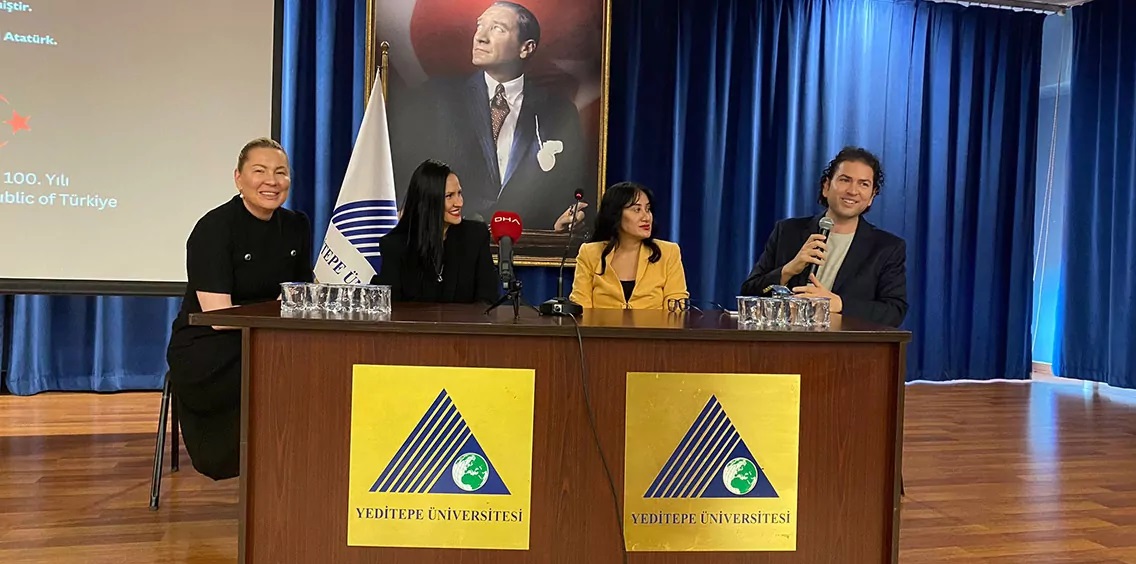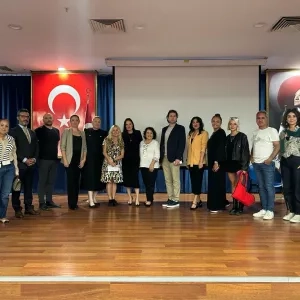Technology for Sustainable Fashion Design

Technology May Prevent the Textile Industry from Polluting the World”
Yeditepe University Textile and Fashion Design Department organized a "Sustainability in Fashion Design" seminar. At the seminar, fashion designer Ezra Çetin stated that the planet is currently at the red line and said, "When our planet came to the same red line five times before this, it exterminated the living things on it and started again. Textiles are the second sector that pollutes the world. At this point, we must create a new concept in textiles and we must work entirely technology-oriented."
The seminar, which was held at the Faculty of Fine Arts Conference Hall of the 26 Ağustos Campus of the University in Ataşehir and moderated by Dr. Müşerref Zeytinoğlu, Head of the Department of Textile and Fashion Design, was attended by Prof. Dr. Sedefhan Oğuz, Advisor to the President, Ezra Çetin and Tuba Çetin, founders of Ezratuba Brand and Zeta Technologies, Ezra Çetin and Tuba Çetin, who are among the ten most successful young people in the world by producing bioplastics from olive seeds and advanced materials in United states of America. Sedefhan Oğuz, Ezra Çetin and Tuba Çetin, founders of Ezratuba Brand and Zeta Technologies, Duygu Yılmaz, CEO and Food Engineer of Biolive, which is among the ten most successful young people in the world by producing bioplastics from olive seeds and received the first place award for advanced materials in the United States of America, Ergi Şener, CEO of NomuPay Turkey, academicians and students attended the seminar. The seminar discussed the importance of sustainable materials for reducing carbon footprint, and waste in the fashion world, and what should be done in production processes.
"We Benefit from Artificial Intelligence in Fashion Education"
Dr. Müşerref Zeytinoğlu, Head of the Department of Textile and Fashion Design, stated that they are working to reduce the carbon footprint and work to ensure that the textile industry pollutes the world less than before and said: "We began to transform our education programs towards both digitalization and sustainability with the pandemic period and the awareness it has brought with it. Our students started to take innovative steps in the textile industry with 3D designs in their collections produced with the concept of sustainability and in our technological workshops that keep up with the digital world. Last year, we started to benefit from artificial intelligence in our projects in an unprejudiced and unique way in the concept designs of student projects.
Zeytinoğlu stated that these steps led to the merging of the university's paths with the Ezra Tuba brand, which represents Türkiye globally in the textile sector, and said, "We launched a series of seminars with the brand, and we intended to contribute to our students to produce projects within the scope of technology and sustainability in cooperation with the Ezra Tuba brand and the university and the sector."
Ezra Çetin stated that they conducted this seminar series to contribute to the training of valuable designers who will sustainably play an active role and continued his words as follows:
"In 2015, we reshaped our brand on wearable technologies and 'Ethical Agriculture.' We started signing different projects to create a global impact, and our final goal is to become a brand that focuses on people and makes a positive contribution to our planet."
"We Manage All Our Processes in Digital"
Emphasizing the importance of sustainability in the fashion and textile industry, Ezra Çetin continued: "When our planet came to the same red line five times before this, it exterminated the living things on it and started again. Textiles are the second sector that pollutes the world. At this point, we must create a new concept in textiles and we must work entirely technology-oriented. Starting to focus on agriculture, we primarily concentrated on rehabilitating the soil, planting the right seed, and ensuring traceability. By digitalizing all processes, we effectively transform design stages to production."
Yılmaz: Bioplastic Raw Material Reduces Carbon Footprint
Food Engineer Duygu Yılmaz described the process of producing bioplastics from olive pits and its benefits: "10 years ago, I saw my father swallowing olive pits for breakfast because he believed they were good for his stomach. Then, I started researching olive pits. We managed to transform olive pits into biopolymers that me and my team were already familiar with. We started to use the bioplastic raw material we produced from olive pits, primarily in the plastics sector. We adapted it to many plastics in different sectors such as electronics, white goods, food packaging, cosmetic packaging, and medical sector."
Explaining that since 2020, they have ensured that vegetable leathers produced from the same raw material are also used in textile and upholstery, Yılmaz continued his words as follows:
"The bioplastic raw material we created from olive pits primarily reduces the carbon footprint. It is also a 100 percent biodegradable product. Among the plastics that are constantly used in plastics that do not disappear in nature, we increase the amount of herbal and produce low-density raw materials. Our manufacturers produced the highest proportion of vegetable leather on the vegetable leather side."
Şener: Collective Action Needed for Sustainability
Ergi Şener stated that sustainability is an interdisciplinary and critically crucial global problem affecting the whole world and said, "This problem requires a collective action by all segments. From governments to academia, from the business world to start-up ecosystem to non-governmental organizations and artists."
Stating that sustainability is handled superficially, Şener said, "To truly make sustainability a part of the corporate culture, it is necessary to embrace and implement it in a way that is at the center of the business strategy."
